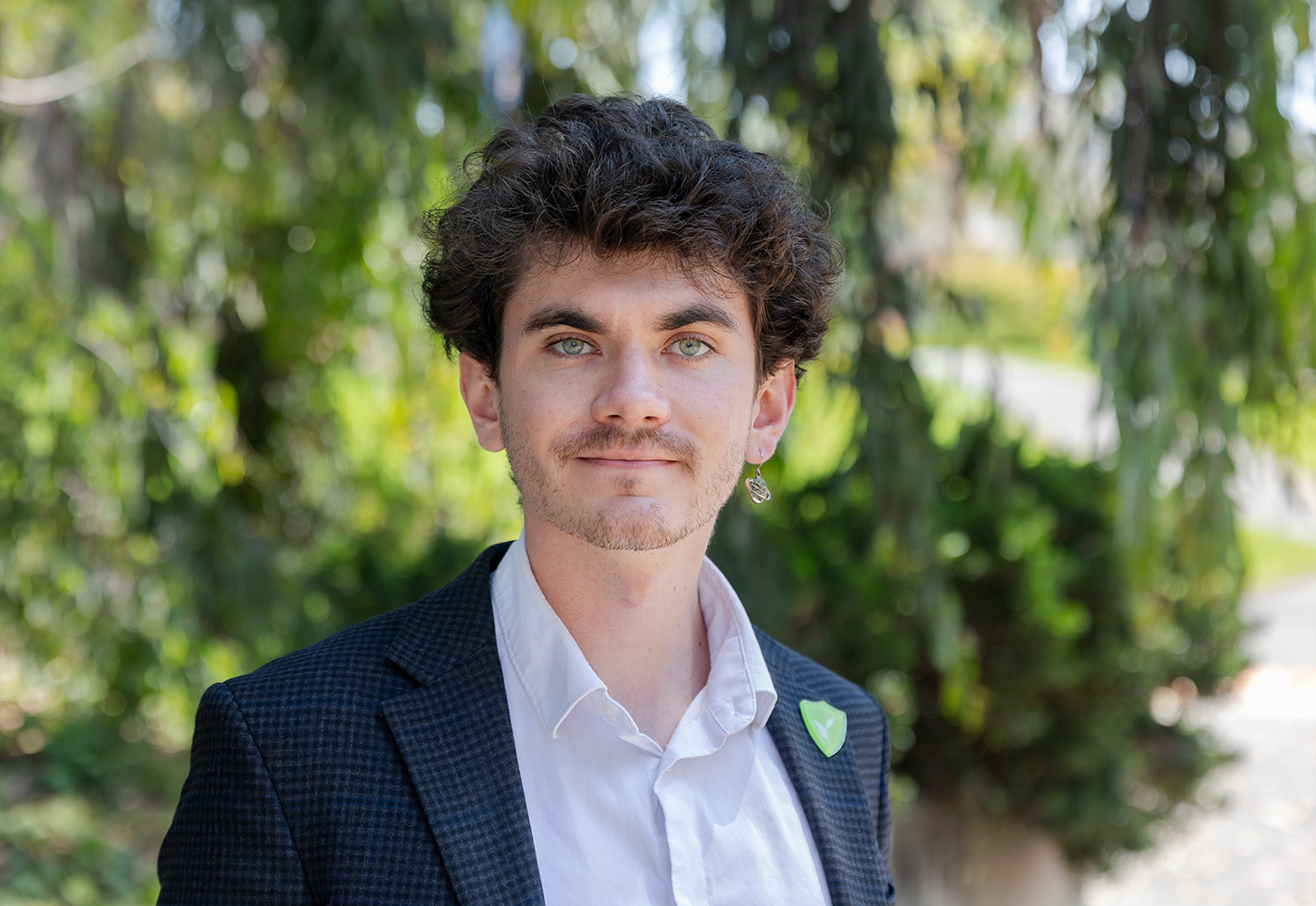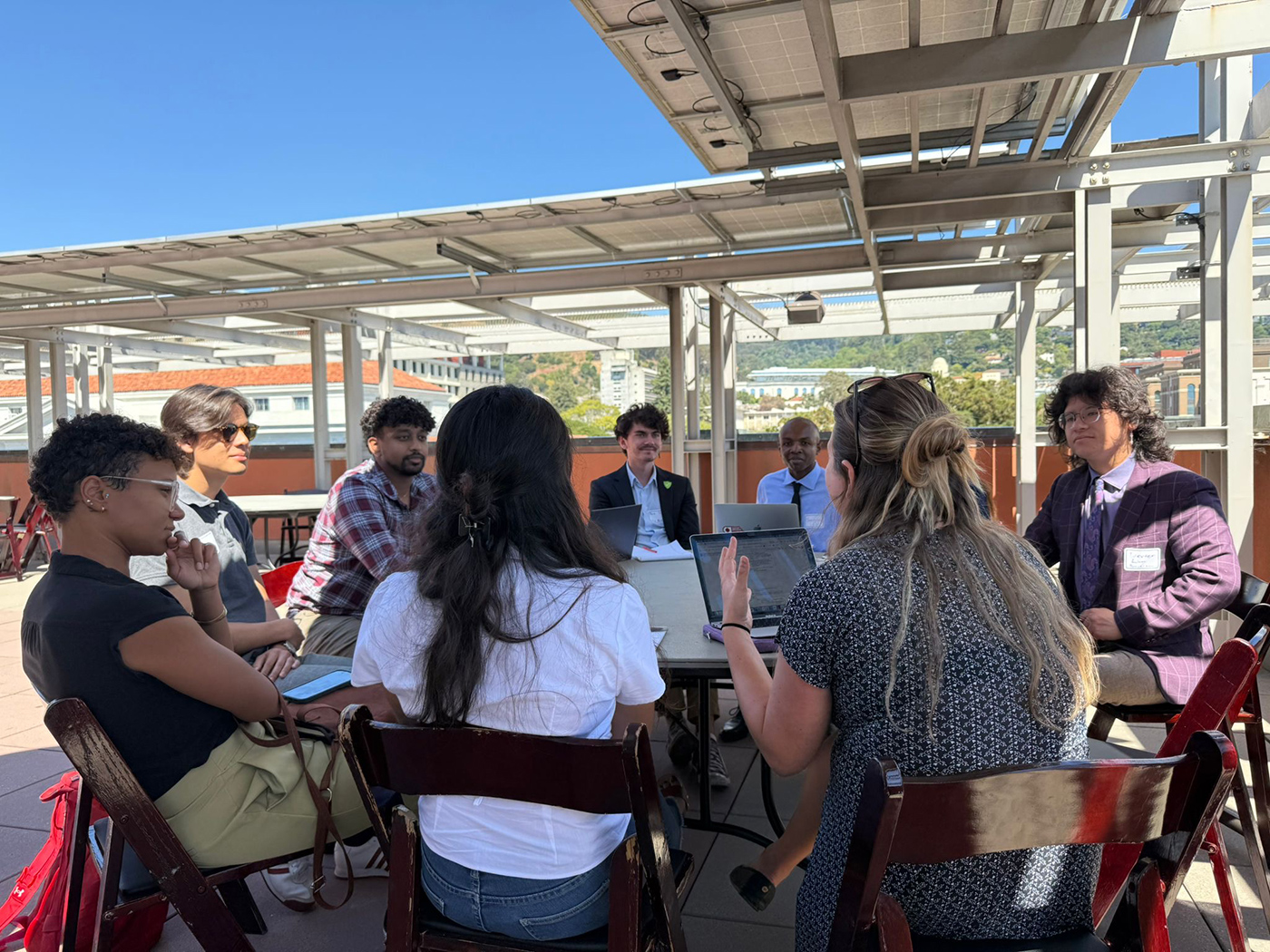
By Andrew Cohen
For most middle schoolers, blending in and not sticking out is a major priority. But at age 13, when 3L Ben Shipman learned that the Amazon rainforest was being burned down to make room for cattle farming, it shook him to his core.
“I gave speeches to my fellow classmates during lunch to go vegetarian to help save the Amazon,” he says. “While it was a hard sell to my fellow 13-year-olds in Texas, I stayed committed in the fight against climate change.”
Shipman majored in Sustainability Studies at the University of Texas, and wrote a science fiction novel for his honors thesis focused on attitudes towards climate change and sustainability from different philosophical perspectives. Wanting to maximize his ability to make a difference in mitigating climate impacts, he applied to law school and felt instantly drawn to UC Berkeley Law.

“In addition to being one of the best schools for environmental law, I immediately fell in love with the place, the people, and the culture of Berkeley when I came to the Bay Area for the first time over Admitted Students Weekend,” he says.
Working with the school’s student journal Ecology Law Quarterly, Shipman and other journal members took a fall camping trip to Pinnacles, Calif. One missing link he saw within UC Berkeley Law’s robust environmental offerings: a group considering the impact of law firm decisions on the climate crisis for many environmentally-minded students who are not necessarily pursuing that field as a career.
In response, Shipman and other journal members, including Chloé F. Smith LL.M. ’24 (now a climate change research fellow at the school’s Center for Law, Energy & the Environment) led the push to create the school’s new Law Students for Climate Accountability (LSCA) chapter. The national organization was formed in 2020 to amplify the legal industry’s roles and responsibilities in the current climate crisis — and to help advance a meaningful transition.
“As a school that sends so many students into BigLaw, bringing conscientiousness into our career decisions with the tools created by LSCA gives Berkeley students the power to drive change in the legal world,” Shipman says.
Keeping score
The organization’s Law Firm Climate Change Scorecard ranks the “Vault 100” law firms according to how much fossil fuels work they have engaged in over a five-year period. Produced annually by LSCA student leaders, the scoreboard aims to draw awareness to the role firms play in creating, implementing, and safeguarding fossil fuel projects — as well as protecting those who profit from them.
“We are uniquely placed to hold firms accountable for their decisions to represent and lobby on behalf of oil and gas corporations at networking events, the hiring process, and by considering their climate impact as a factor in deciding where we work,” Shipman says.

The Berkeley chapter recently hosted LSCA’s first-ever conference. The event helped expand the chapter’s California network and connected interested students and practitioners around the country and the world.
Panelists addressed climate resiliency and developments in movement lawyering around the climate crisis, and discussed strategies for continuing to build the movement, forge coalitions, and plan LSCA’s Global Day of Action for Climate Justice. Over 40 people attended in-person or virtually from Australia, Brazil, Canada, Germany, South Africa, Switzerland, and the U.K.
“Berkeley was the perfect place to bring together students, attorneys, and professors involved in LSCA from around the world,” says Shipman, who has interned with the Center for Biological Diversity and done a field placement with the Environment and Land Use Section of the California Department of Justice’s Public Rights Division. “This conference jumpstarted our California regional network, and I’m confident that we can use that momentum to expand our network with law students and practitioners in California and beyond.”
Leading in multiple directions
Shipman’s leadership skills will also be put to use this year as co-president of the Student Association at Berkeley Law (SABL), the school’s student government organization. SABL organizes activities, helps new students adjust to law school by sponsoring social, athletic, and law-related events, represents student interests in curriculum planning, admissions policy, faculty hiring, and other areas, and allocates funds to each of the school’s student groups.
“We hope to continue to plan events to bring the entire Berkeley class together, as well as to build cross-campus community by connecting with the student associations of other UC schools in the Bay Area,” Shipman says. “It was incredibly rewarding to have been elected as co-president after serving as 2L Representative last year. I love the Berkeley community, and I’m honored to have the chance to represent and give back to an amazing community of future lawyers.”
As if his plate wasn’t full enough, Shipman is also the creator of the board game Topper Knocker, which he designed with a cousin over 10 years ago using pieces from other games to make their own. After nearly a decade of prototyping and playtesting, they printed an initial run, sold 100 copies, and last year incorporated as an LLC through UC Berkeley Law’s Startup Law Initiative.
While Shipman does not envision board game design as a full-time career, he’s exploring how to bridge the law with board games while still keeping them fun — and using board games as a medium to communicate ideas about sustainability.
The next game he is designing, Drought, focuses on the Colorado River Basin water crisis. It puts the Tragedy of the Commons — an economic theory describing how individuals acting in their own self-interest will deplete a shared, limited resource even though doing so harms everyone in the long run — into a board game format where players each represent competing interests fighting over water rights.